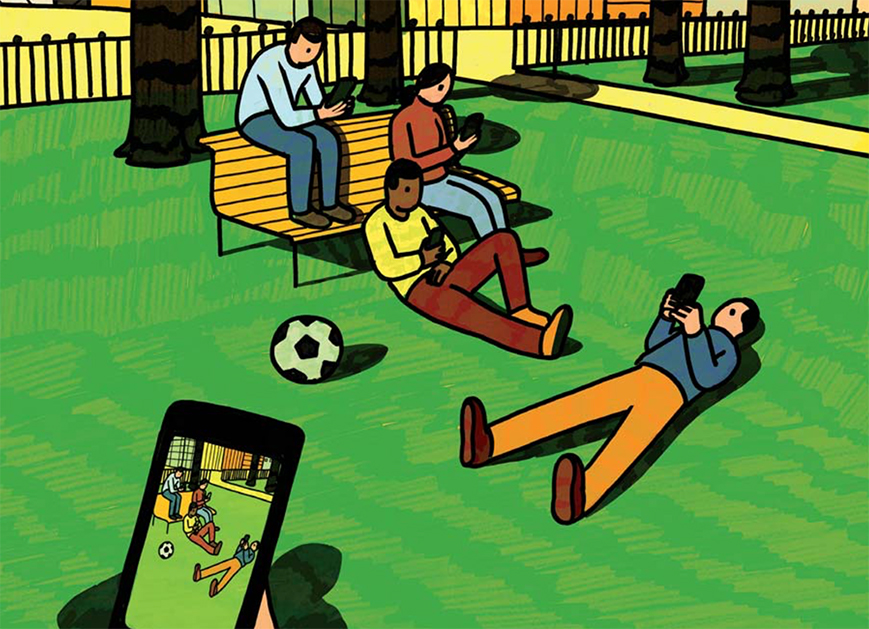
Recently I read about luxury hotels offering “digital detox visits” for guests looking to turn off their phones for a weekend. One hotel will put your phone in “a soft, locked pouch” that stays with you, but can only be opened by staff—like Odysseus’ crew, tying him to the mast, protecting him from the seductive call of the Sirens.
I had to laugh, because I digitally detoxed seven years ago—not for a weekend, but permanently. My new life began on a May afternoon in Berlin, where a crafty pickpocket relieved me of both passport and phone. I replaced the passport, but not the phone. Since then I have lived phone-free.
It’s no accident that my decision coincided with the rise of the smartphone. I coexisted happily with the old flip phones because they were helpful devices; we used them, and not the other way around. But our smartphone use quickly took on the aspect of a mass captivity, and I didn’t want to be one of the captives.
The nature of that captivity is well documented. Surveys show that college students check their devices 220 times a day. A 2017 Atlantic article listed the dismal hallmarks of adolescent life under the Rule of the Phone. A decline in the capacity for intimacy. Higher rates of anxiety and loneliness. Difficulty sleeping. A homebody inclination, verging on agoraphobia, reflecting a social life “managed” from one’s room. And it isn’t just teenagers. In her book Reclaiming Conversation, MIT psychologist Sherry Turkle argues that digital devices are degrading everyone’s relationships with family, friends and colleagues. Neuroscientists, meanwhile, have shown that the mere presence of one’s smartphone—even when turned off—weakens the ability to focus. It’s all about jonesing for the dopamine rush we get each time the ping! announces an incoming text.
I didn’t need research to see that we’ve become a nation of smartphone addicts. My teacher friends describe the rage of students forced to give up their phones in class, and every day I see people texting while driving. That’s dangerous; other stuff is just sad. Recently I went to the gym with my 12-year-old daughter. On our way out, as we bantered with each other, a guy and his young son were entering—both sunk in their phones. I felt like shaking him. You’ve got a few precious years with your kid, and this is what you’re doing?
I’m no raving Luddite; I’m just trying to pay attention to the bargain we make with our amazing machines of convenience. What gets lost in the process? Of course, the history of innovation is littered with outmoded and discarded skills; nobody cares about not knowing how to shoe a horse or read Morse Code. But what happens when the skill we’re discarding is our ability to converse face-to-face? Or to write a complex sentence? Or to be alone with ourselves? How do we outsource a capacity for solitude?
It would be one thing if devices were deployed as tools for discrete problem-solving actions—if three times a day you’d fire it up, use it, then shut it down. But no one does this. The signature reality of the smartphone is the speed with which it has annexed the self. People may agree—in theory—that handheld use has gotten out of control. But what do they do? My friends, for instance, knowing my animus on this topic, struggle heroically to keep their devices out of sight. But I see them, discreetly glancing down, checking in.
When I tell people I don’t have a phone, they’re astonished. You mean, at all? The reaction is a mix of disbelief, curiosity, envy and pity. It’s strange for me. I’m a pretty middle-of-the-road person, unused to being the voice crying in the wilderness. And it isn’t that I feel superior or aloof. I know that if I had a phone, I’d behave exactly the way everyone else does. In ditching my phone I acted preemptively, because I didn’t want to be chained to it. My bafflement is not that people use their phones the way they do, but that they don’t see how enormous the transformation has been, and the cost; that they’re not distressed by it.
I know the battle is probably lost. But I can’t help noting that the lords of Silicon Valley, who invented these devices in the first place, are having their kids educated in schools where their inventions are not allowed. Do you think maybe they know something? And so my own action plan revolves around our daughter, and our policy of no phone until she’s 16. The goal is to get her wired for sustained focus and for negotiating complex language in print, instead of for the jittery, ever-shifting cognition and attenuated communications of the digital world.
As for me, my phone-free life goes along just fine. And as for you, I’m hoping you’ll do that detox weekend. Unplugging the virtual and rebooting the actual can be a beautiful experience. So strap yourself to the mast, put the phone in the lockbox and resist the siren song that has lured us all toward a perilous shore. You can do it. In fact, I’m counting on you.
In 300 words or fewer, respond to Cooper’s critique and make the case that smartphones have been more beneficial than not to you and your family. Send this counterargument to magazine@amherst.edu for possible publication. We’d love to hear from those who agree with Cooper, too.
Cooper, a contributing editor at Commonweal, writes the “In Our Midst” column for Hartford Magazine.